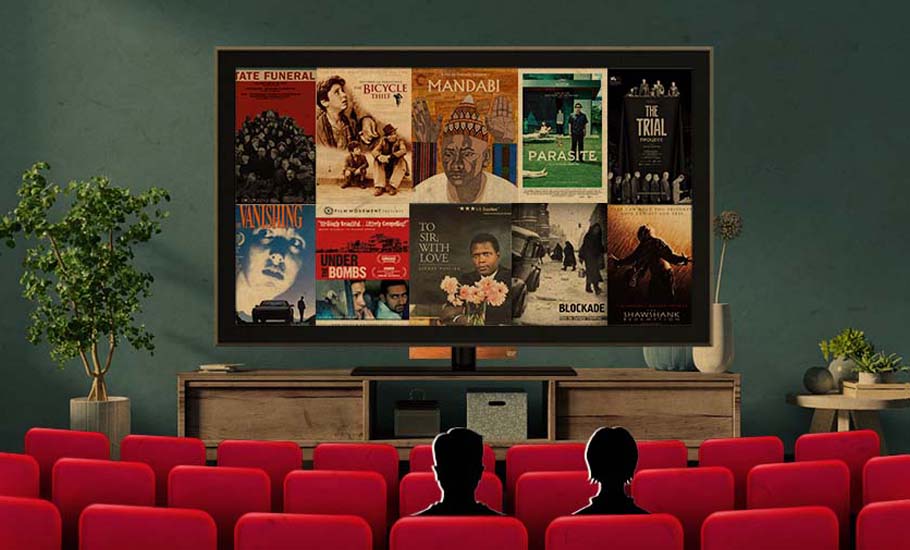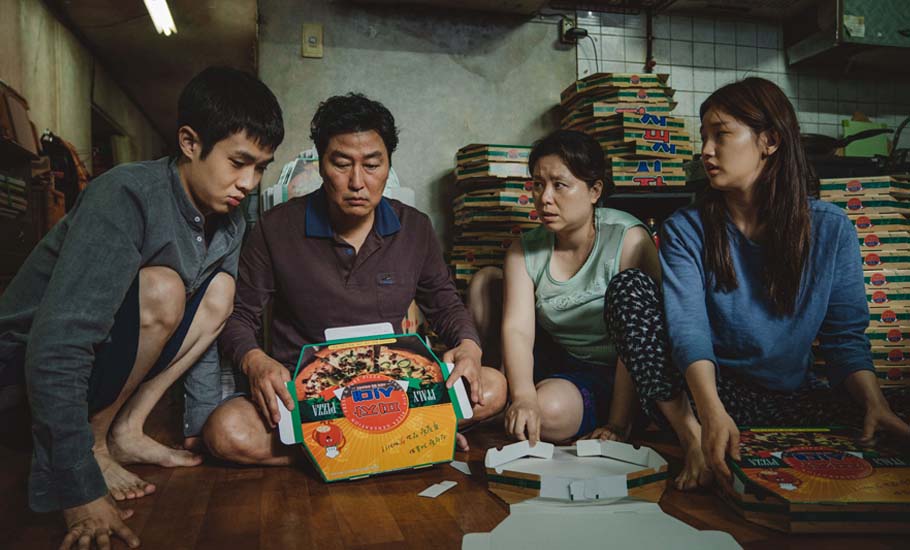
- Home
- News
- Analysis
- States
- Perspective
- Videos
- Education
- Entertainment
- Elections
- World Cup 2023
- Features
- Health
- Business
- Series
- Economy Series
- Earth Day
- Kashmir’s Frozen Turbulence
- India@75
- The legend of Ramjanmabhoomi
- Liberalisation@30
- How to tame a dragon
- Celebrating biodiversity
- Farm Matters
- 50 days of solitude
- Bringing Migrants Home
- Budget 2020
- Jharkhand Votes
- The Federal Investigates
- The Federal Impact
- Vanishing Sand
- Gandhi @ 150
- Andhra Today
- Field report
- Operation Gulmarg
- Pandemic @1 Mn in India
- The Federal Year-End
- The Zero Year
- Premium
- Science
- Brand studio
- Home
- NewsNews
- Analysis
- StatesStates
- PerspectivePerspective
- VideosVideos
- Entertainment
- ElectionsElections
- Sports
- Loading...
Sports - Features
- BusinessBusiness
- Premium
- Loading...
Premium

Thanks to OTT, an international film festival is on 365 days a year

Scene 1 (The Year 1987, Month: January. Location: Mumbai, Time: 5.30pm) The protagonist, a copy editor with a daily news tabloid, is getting frantic. Time is running out. He is saddled with a host of copies to edit. It would have been par for the course on other days. But today is different. Russian filmmaker Andrei Tarkovsky’s The Sacrifice is scheduled for screening at 6.30 pm. Somehow,...
 Scene 1
Scene 1
(The Year 1987, Month: January. Location: Mumbai, Time: 5.30pm)
The protagonist, a copy editor with a daily news tabloid, is getting frantic. Time is running out. He is saddled with a host of copies to edit. It would have been par for the course on other days. But today is different. Russian filmmaker Andrei Tarkovsky’s The Sacrifice is scheduled for screening at 6.30 pm. Somehow, he manages to finish his work and runs out. The time: 5.50 pm. At the Churchgate local train station, there is a long queue for tickets. Our protagonist is in a hurry. Otherwise law-abiding, this one time he decides to travel ticketless, the risk worth a Tarkovsky.
At the Mahalaxmi station, he jumps out of the train and moves towards the exit along with the multitudes who head out along with him. He is a trifle unsure, trying to keep himself calm, feigning confidence as he comes upon a wall of ticket checkers. They just stand there without actually stopping anyone, and he hopes he too can slide past them. Why should they pick him out among the horde of commuters? The chances seem remote.
As he walks past nonchalantly, a hand grips his shoulder. He’s caught! The protagonist shocked at being picked out, shame-faced at being caught, hurriedly coughs up the penalty–the whole episode lasting under five minutes. The ticket-checker says nothing, simply collects the fine. But the copy editor’s brain rings with terms society jeers at–“Thief, offender, crook…” But, never mind the sacrifice to his integrity, the larger purpose is served. He is just in time for Tarkovsky. The lights in the auditorium go off as he settles in his seat.
Scene 2
(The year 1988, Month: November. Location: Delhi. Time: Five minutes to midnight)
The protagonist walks through a sleeping city. The streets are deserted except for an occasional car or two-wheeler. The autumn mist hangs in the air, the visibility fast reducing. But his mind is full of The Vanishing, a Dutch thriller by George Sluizer, in an auditorium near Hauz Khas. It has been a lifetime experience–a kind of film that one cannot easily forget. It’s working on his mind as he relives the film, scene by scene, oblivious to his surroundings. It is more than a 40-minute walk. Near the IIT main gate, a scooter slows down near him disturbing his reverie. His heart skips a beat. Is he going to get mugged? He freezes, wondering whether to make a run for it. The scooterist yells, “Young man, want a lift?” Relieved, the protagonist takes up the offer. The helpful stranger drops him off at his university gate some distance away. Fortunately, the movie has not spilled over into real life. It’s a dark moonless night and he is relieved to arrive at his room in the hostel.
Scene 3
(The year 2021, Month: June. Location: Bengaluru. Time: 9.45 pm)
The protagonist settles with a drink and grilled peanuts in front of the LCD TV in the living room, a smart phone in hand. He quickly scrolls through the long list of awesome foreign films on OTT and chooses a French-made Lebanese flick, Under the Bombs. Needless to add, it doesn’t disappoint. And, the process–easier than stepping out for a breath of fresh air.

* * *
Time has turned a corner. 2021 marks an apogee, nay, a revolution in film-viewing. The world has come tumbling into our living rooms. In an otherwise grim world, with stuff like climate change and rising authoritarianism, this deserves a celebration.
But let’s first revisit the 1980s. Those were the days when foreign-language movies, other than Hollywood, were rarely screened in movie theatres. You had to make time and go out of your way if you wanted to see any. Movies meant for festivals were almost always screened at odd times. It could be a Sunday morning 8 am show. To see the film required commitment of a high order—imagine having to wake up on a Sunday at 8 am, when the rest of the family and friends are snug in their beds. In most cases, the screenings would be in auditoriums that were not regular cinema houses and needed special passes for entry. If you were not in the film club network, it was next to impossible to gain access.
If anyone were to prophesize that 40 years later these very rare films, be it Hungarian, Iranian, Czech, Polish, South Korean or any of the Latin American movies, and much more would have been available at home on television, that would be described as ludicrous. There were no smart TVs, and mobile phones were still several years away. It would have required a sci-fi writer with great imagination to foresee such a possibility.
Today, especially since the Covid outbreak, a surfeit of foreign films of high quality are jostling with one another for the aficionado’s attention. Who could have imagined that top-rated films that we, of an earlier generation, struggled to see would be strewn around for anyone to pick and choose.
A South Korean flick, Parasite, gets the Oscars. A few weeks later that very film is screened on an OTT platform. So too are films that are routinely discussed and deconstructed threadbare in movie-making courses – The Shawshank Redemption, To Sir, with Love, Bicycle Thieves and Akira Kurosawa’s Rashomon, to name a few.

For film buffs, or the more extreme movie-addicts, and students of cinema, the going has never been this great. Simply download an app, pay a monthly fee and you have the best of films the world can offer.
Not just feature films, but also documentaries. Always overshadowed by features, documentaries were almost next to impossible to lay hands on. Not anymore. For example, a series of rare Soviet-era documentaries woven together by Ukranian filmmaker Sergei Loznitsa is on OTT even as this is being written. One of them deals with the fascinating topic on the death of legendary Soviet premier Joseph Stalin, titled State Funeral, showing the reaction in Soviet Union the day news broke of his death on March 5, 1953.
The film, running into 155 minutes, gives a detailed insight on how people responded to his death, the manner in which the announcement was made–on loudspeakers across the nation, the carefully chosen facts that detailed what happened to him leading to his death etc. Hundreds of cameramen, employed by the Soviet Communist Party, shot the film across the Soviet Union. The film stitches together their footages into one magnum opus.
In an earlier time, it would have been next to impossible to see such films in India, except for a handful of lucky souls who may have seen them in the festival film circuit. Now there are so many of these fascinating flicks there is no time to see all of them, as one needs to do other things in life as well, like eating, sleeping, working etc. Another Loznitsa flick, The Trial, is still on this writer’s wish list. It deals with 1930 Moscow and the prosecution of a group of engineers and economists who were put on trial on charges of plotting a coup d’état.
So too does Blockade, a fascinating documentary shot during the 900-day siege of Leningrad during the Second World War—all of which Loznitsa recreates into one cohesive film from footage in Soviet archives.
In today’s world, every day is a veritable film festival. No longer does one need to struggle to get access to rare foreign films. Be it Iranian, Vietnamese, Serbian or Indonesian, they are all there for your “viewing pleasure”, to borrow a line from a jingle.
There was one surprise recently in the form of Ousmane Sembene’s Mandabi, a Senegalese film that was the first ever to be made by an African director in an African language. A 1968 film, it was restored and featured on an OTT channel. Mandabi means “money order” in the Wolof language. The film deals with the simple story of the troubles faced by the protagonist in encashing a money order he receives from his nephew in Paris.
The exposure to these varied films represents the democratisation of film-viewing that until recently existed only in the arcane world of film enthusiasts who too had to sweat it out to see them, like this writer did. But today, simply anyone can see these films from their living rooms. Yes, watching art house cinema may not be to everyone’s taste but it grows on you surreptitiously, until the viewer one day realises it is difficult to stomach commercially produced dumbed-down films ostensibly meant for the so-called masses.

We are still in the early stages of a revolutionary movie-watching experience. But change is coming, that’s a no-brainer. The best of world cinema literally in everyone’s palm via the mobile phone, by casting or through smart TVs, into living rooms is bound to shake up the insulated world of filmmaking.
There was a time, until recently, when the film-hungry consumer had to make do with yawn-inducing trash. But now, with such unbelievably easy access and an impossible array of excellent flicks–both features and documentaries–available for one’s picking, the stale, stereotypical, boring and tedious films that dominated the filmscape will have to naturally die a slow death.
The ultimate beneficiary–you, me and all the other movie addicts.
(Disclosure: The protagonist in Scenes 1, 2 and 3 is the writer of this article)

